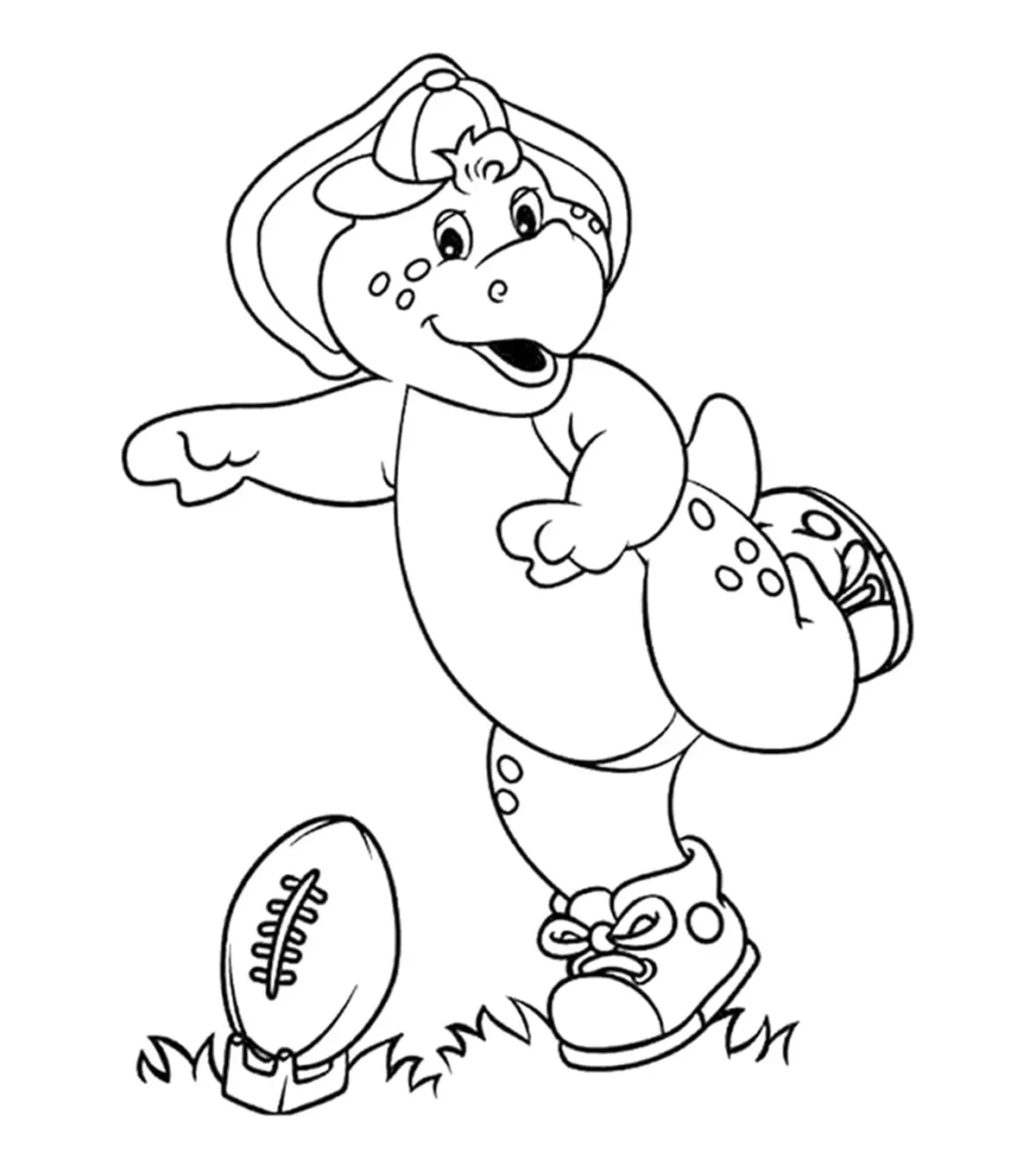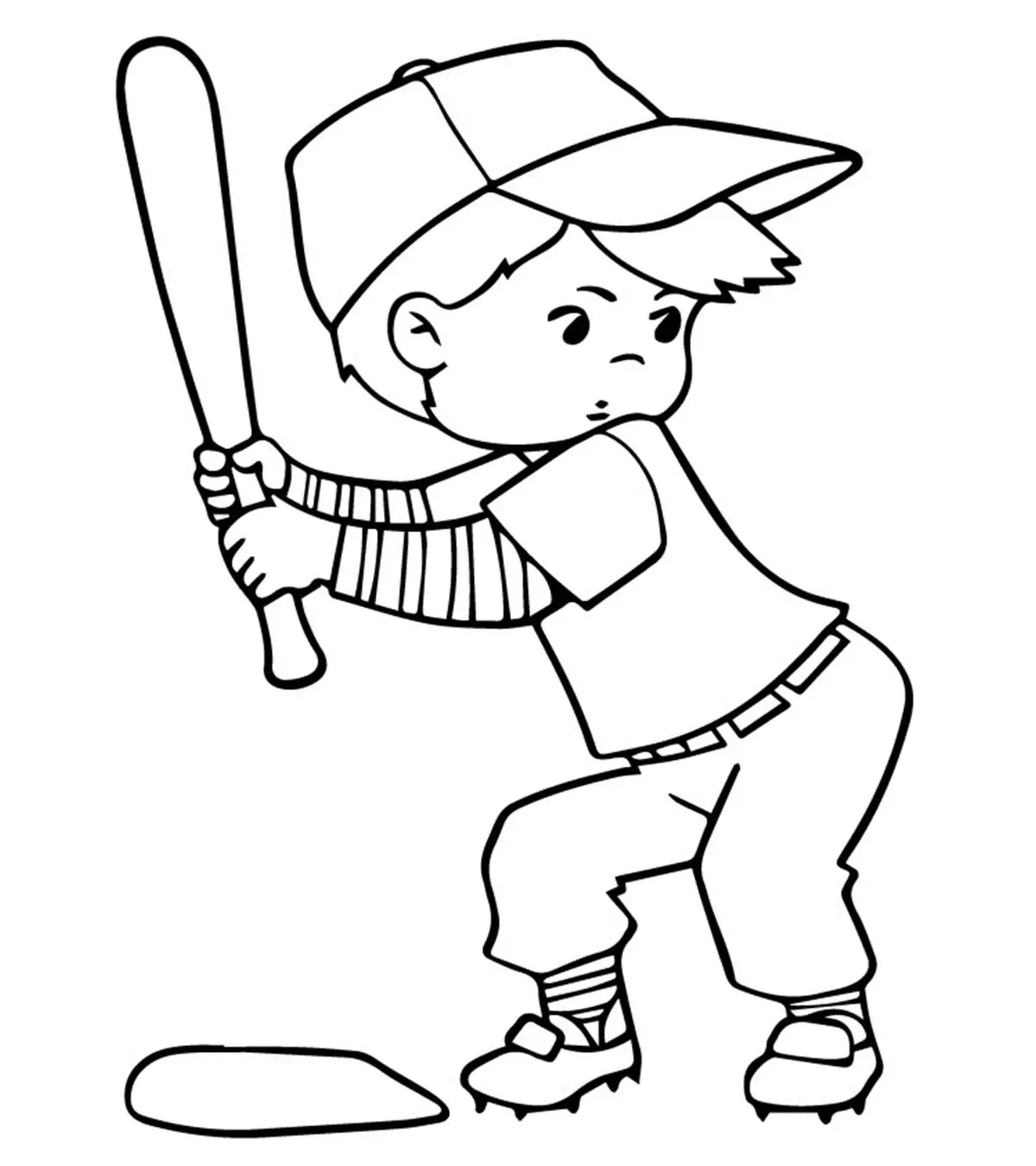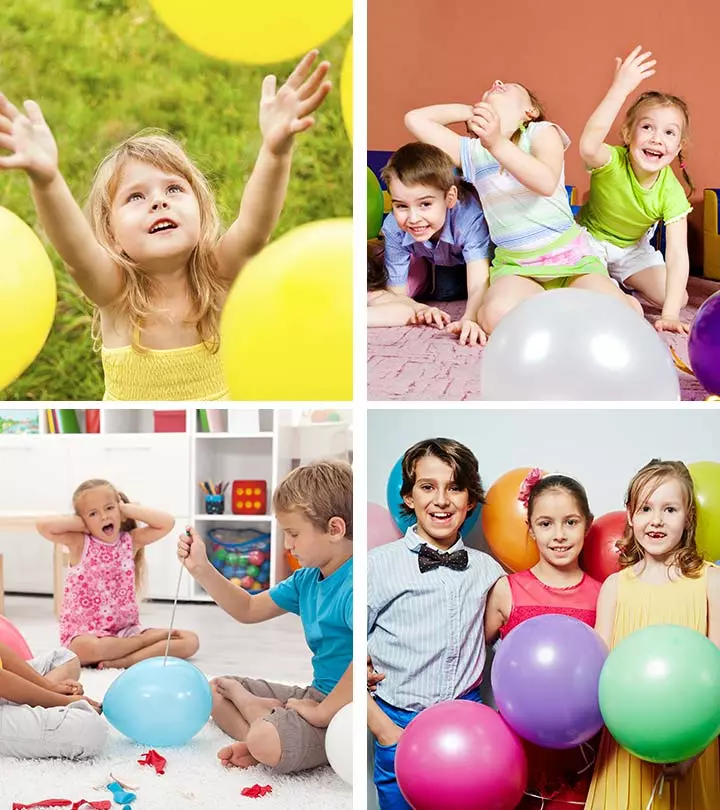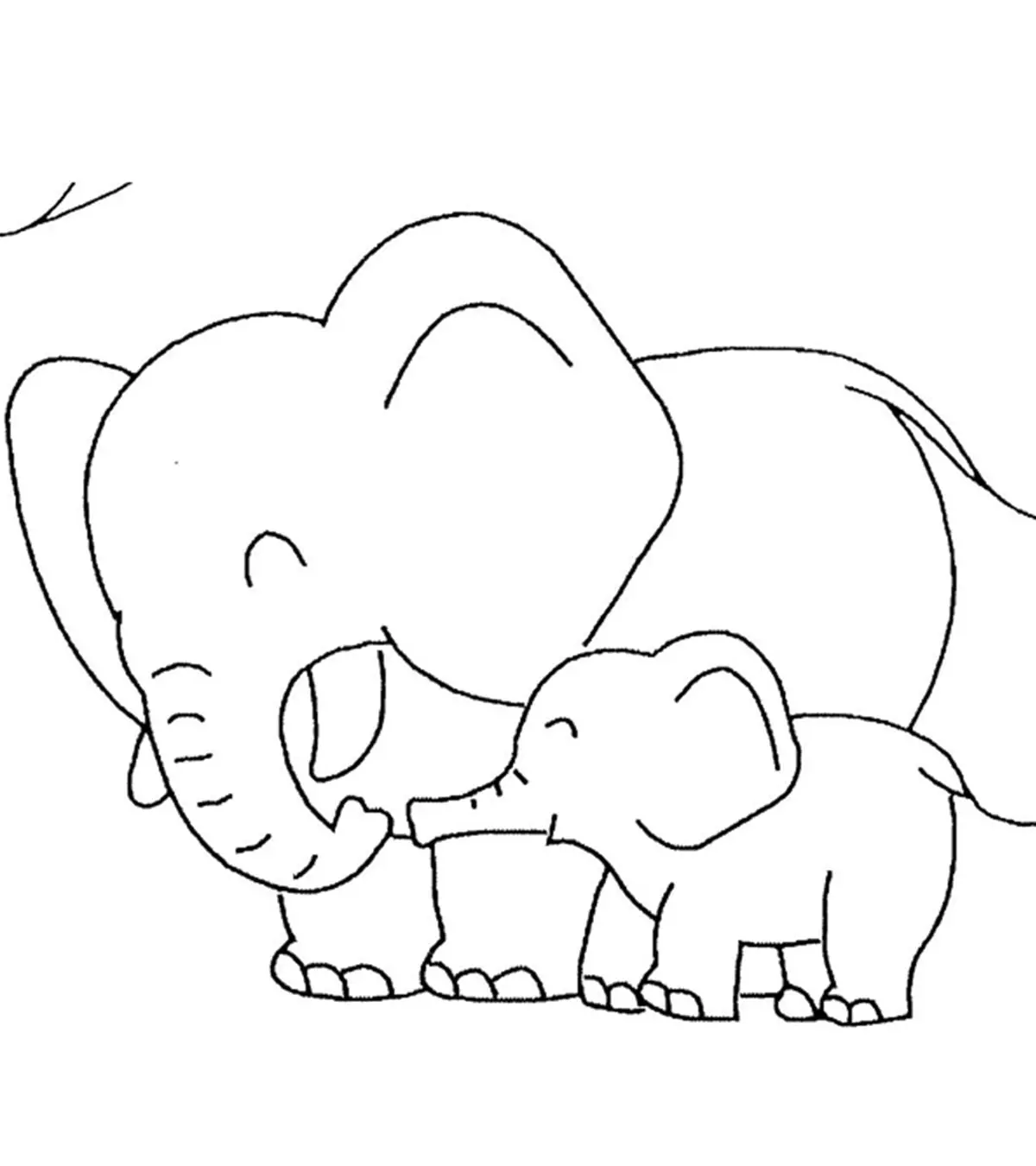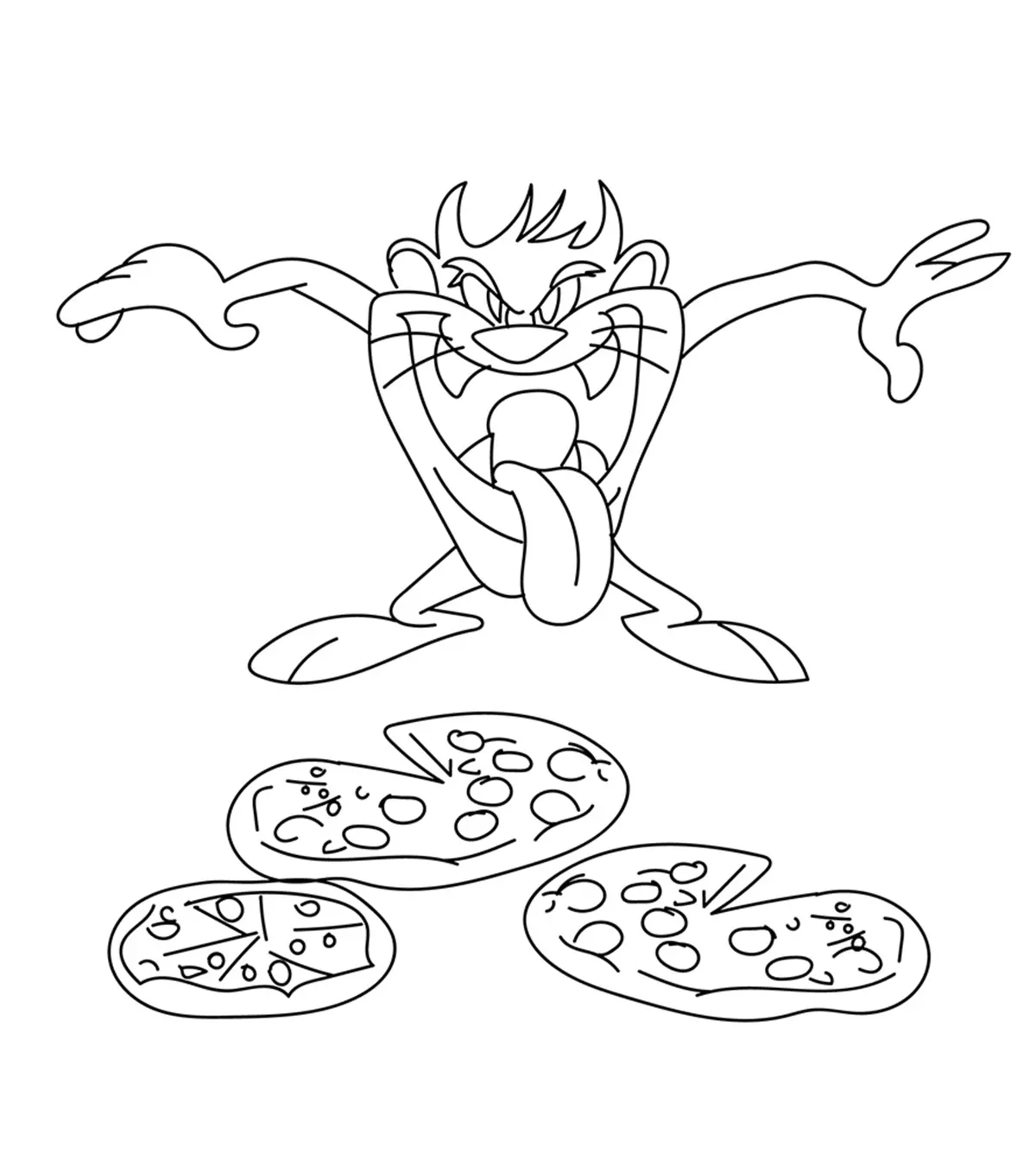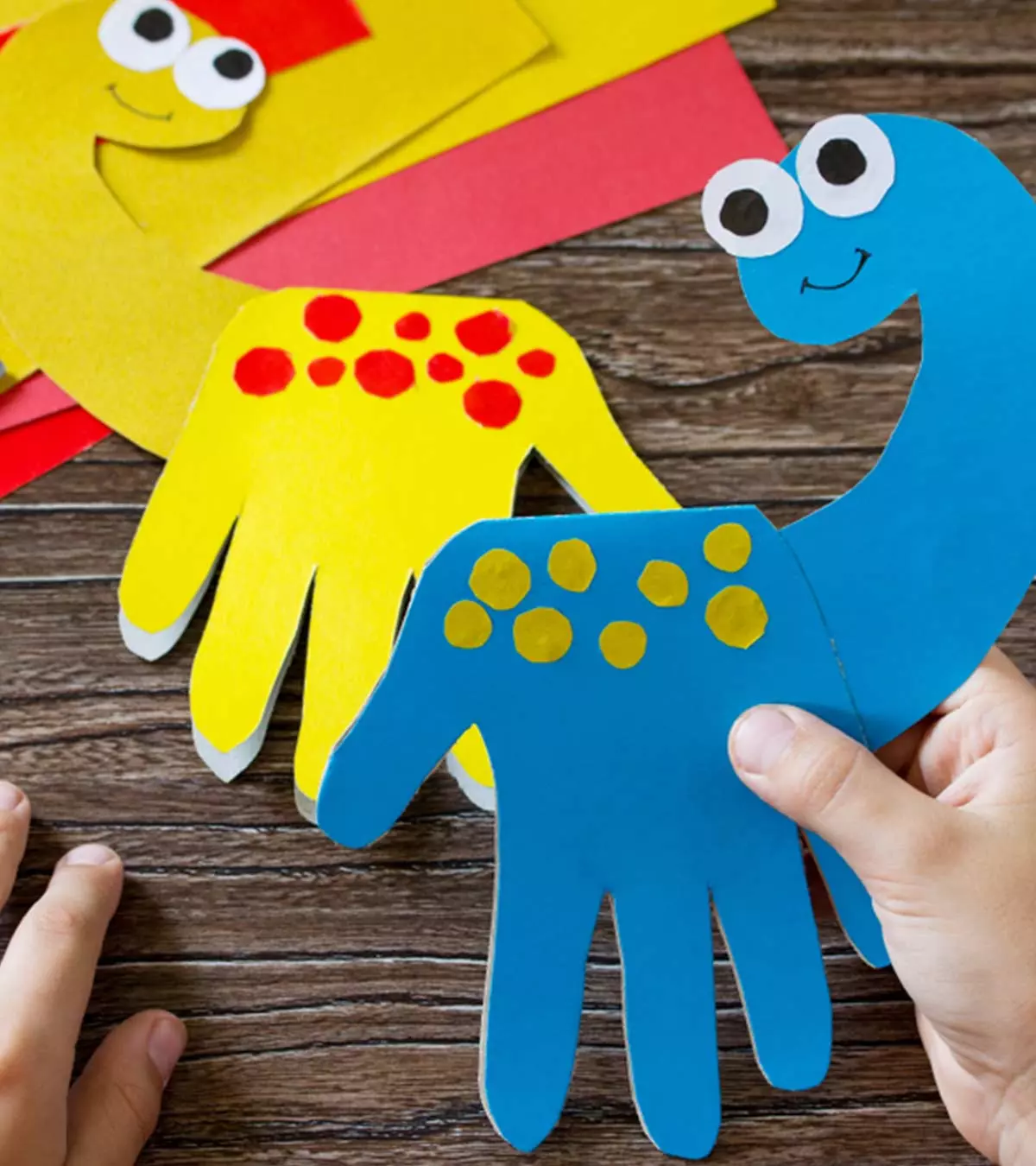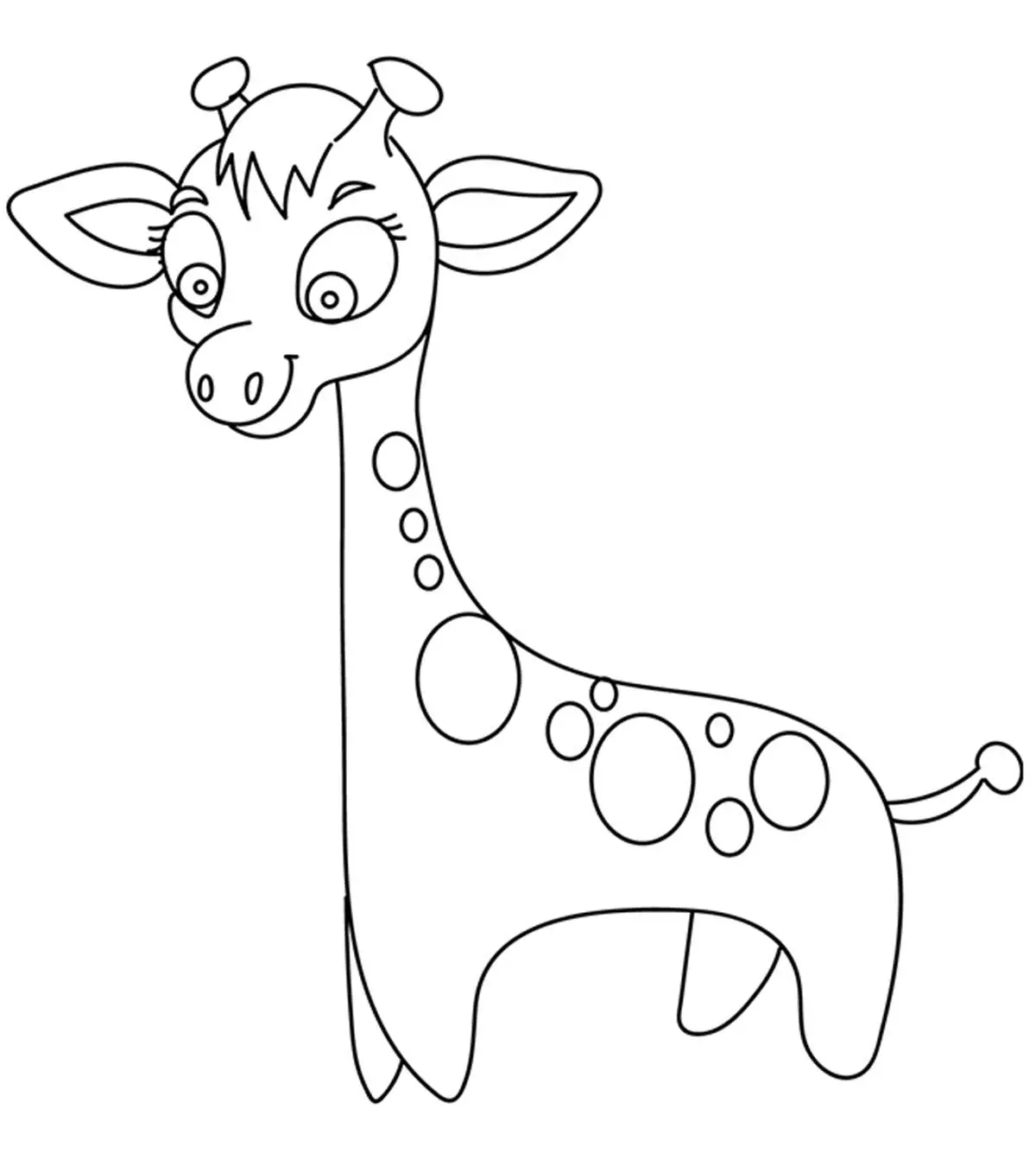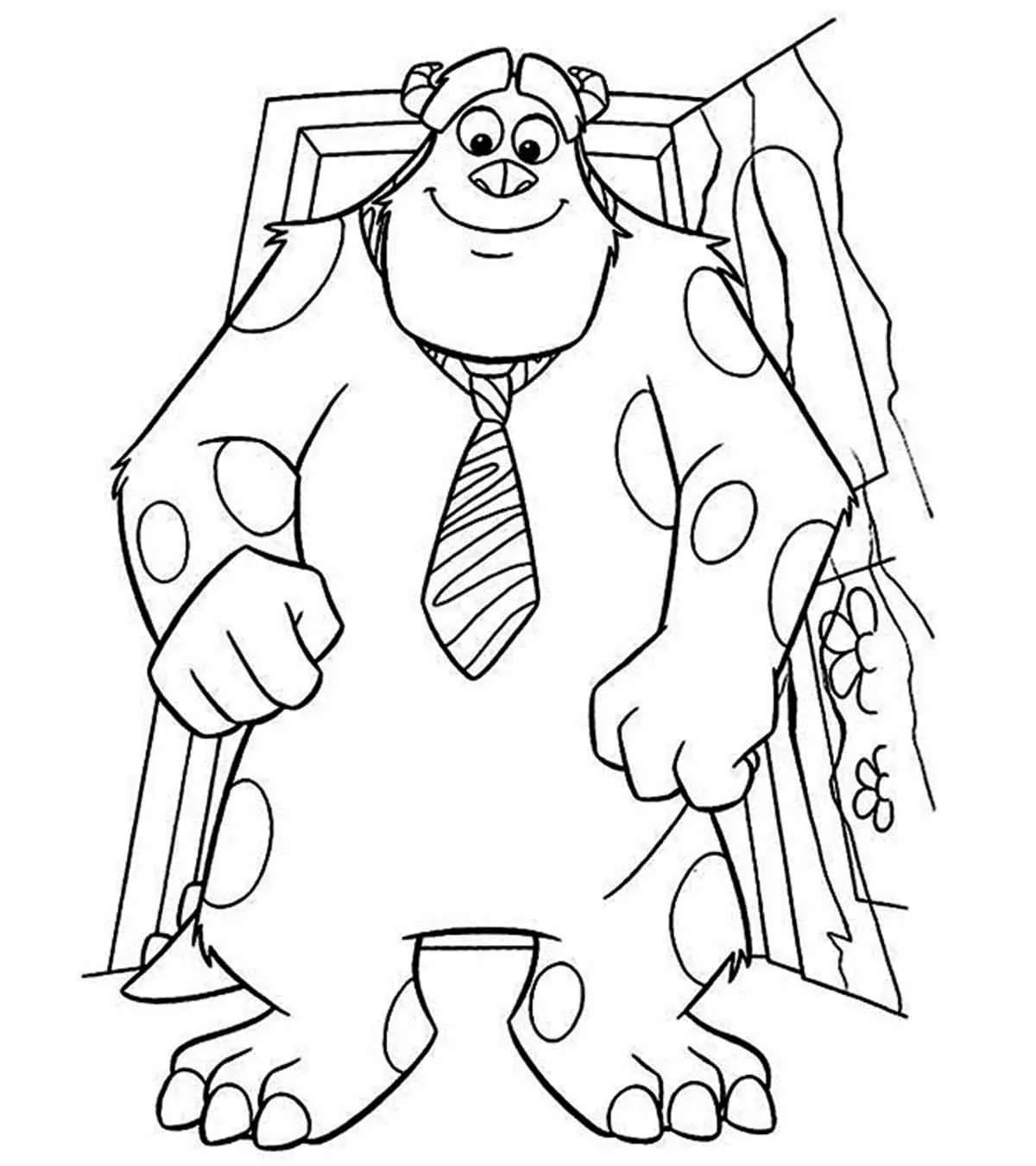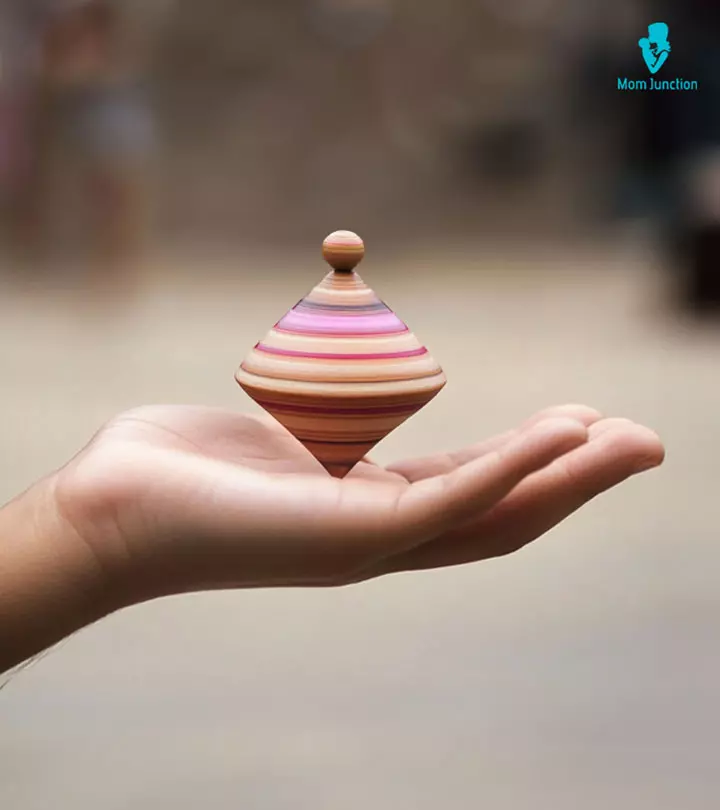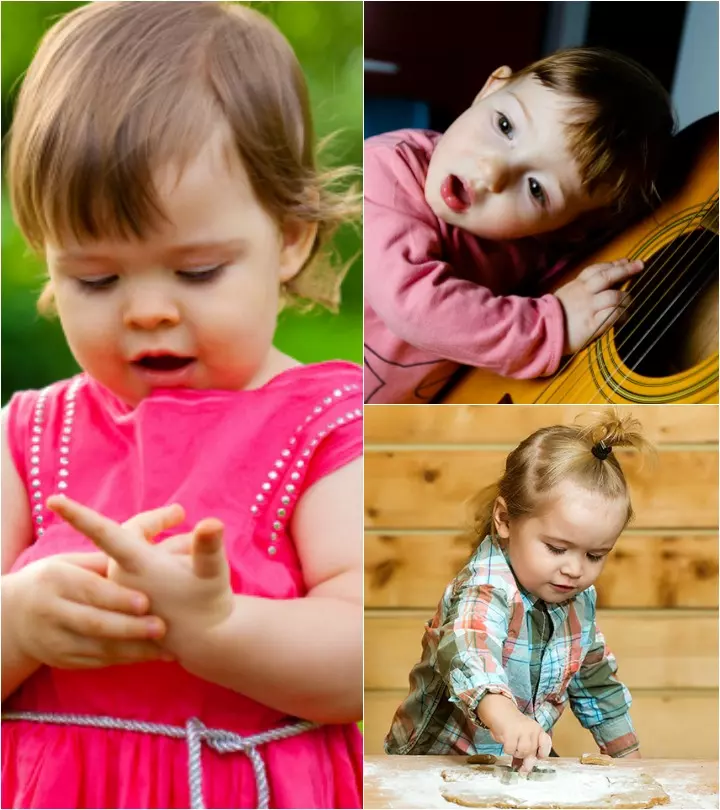
Image: ShutterStock
Your 18-month-old toddler is bound to be moving around independently. You may want to know about some exciting games and activities for 18-month-old babies to keep them engaged. Whether toddling around, scribbling something on the walls, saying the first word, or even getting the first tooth, these are the milestones that must be tracked. There is a time when you must engage your child and keep them occupied to ensure healthy physical and mental development.

Here are some of the games that you may consider exploring and trying for your toddler.
Key Pointers
- An 18-month old baby has better attention and thinking, improved physical development, sharper senses, and improved social skills.
- Freeze, Walk the line, Puzzles and mazes, Pass the ball at once, and Slipping ice, which are great developmental activities.
- Educational and learning activities such as Simon says, Counting on fingers, Trace the drawing, Building blocks, and String the guitar are also beneficial.
- Sensory activities like Animal sounds, Dough lumps, Paint palm print, and Family photo time can be enjoyable and stimulating for babies.
Key Developmental Milestones For An 18-Month-Old
Within one-and-a-half years, your baby has learned a lot. Right from looking and smiling at you to crawling and throwing tantrums, you have seen them do all that. So, what do they learn now? (1) (2)
- Better attention and thinking: If your 18-month-old loves a game, toy or an activity they will sit and play with it for a longer time than they did as a baby. They will also be good at interpreting cause and effect actions and use past experiences to draw inferences.
- Improved physical development: They can now walk quite independently and can run in short bursts. Their muscles are capable of performing complex actions like feeding themselves with a spoon (clumsily, though!), removing some pieces of clothing like a jacket or sweater, and wearing simple footwear like flip-flops.
- Shaper senses: Your toddler can now see objects and recognize faces at a distance. They will also remember familiar sounds (mom’s hair dryer, dad’s car horn), and respond appropriately to it. If they did not like a food item earlier, they would refuse to eat it again since they remember the taste.
- Improved social skills: They enjoy sitting in front of their parents to play. They will then show you achievements in the activity and expect a reward or appreciation. They may throw a tantrum when they are forced to be in the company of people they do not like. An 18-month-old will be cautious towards strangers and display affection towards familiar faces. They may now also speak simple but meaningful words.
Babies usually start speaking at 10-15 months of age, though it may vary. As shown in the graph below, babies can be gradual learners, learning about 10-20 words per month, or some babies might start speaking late and at a much slower rate but may have a sudden vocabulary spurt at 18-month age. They may know about 100 words at 19 months old, significantly higher than roughly 40 words at 18 months old.

Vocabulary growth in babies aged 14-20 months
Source: Language Development: From Listening to Speaking; Institute for Learning & Brain SciencesTherefore, what can be the right? Keep reading to explore some interesting and age-appropriate games and activities that will give an impetus to learning of an 18 month old baby.
25+ Games And Activities For 18-Month-Olds
Every time you play with your toddler, try a different game to make playtime fun and engaging. Then, see which activity they like the most. We have divided the 18-month-old activities and games into three categories to make it easy for you to choose:
- Developmental activities
- Educational and learning activities
- Sensory activities
Developmental Activities
Developmental activities target the physical, mental and social development of your baby.
1. Freeze!
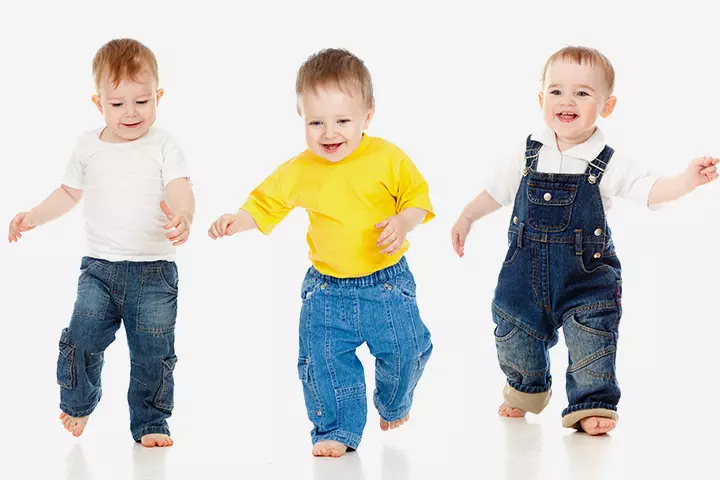
You will need: Your partner, a music player, and a few other tots.
How to: Make the tots stand in a row with your partner leading it. Instruct them to dance at the same spot while the music plays. The moment the music stops, you shout “Freeze!” and everyone freezes at their place. Do not have any elimination, but give a treat to the one who stays still for the longest time. Ensure that all get a treat by the end of the game. The idea of having your partner dance with them is to provide a visual cue to the tots in case they get confused (3). You can dress up your toddler for the activity and ask your partner to dress up, too, to make the activity more fun and exciting.
Skills developed: Social playiCollaborative interactions of peers during play. , muscle coordination
2. The laundry basket game
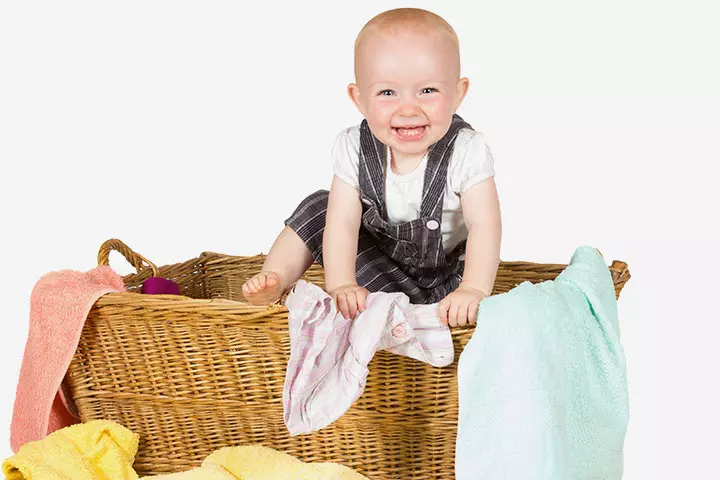
You will need: A laundry basket full of clothes
How to: Fill the laundry basket with clothes and put it in front of the baby. Ask them to “take out” the clothes from the basket. Show them how to do it in case they do not understand. Once they take out all the clothes, ask them to put them back again. Reinforce the activity by asking them “Did you put the clothes in the basket?” to which they would nod their head and say “Yes!”
Skills developed: Instruction obedience, instruction-action interplay
3. Walk the line

You will need: Packaging duct tape
How to: Stick the tape in a straight line on the floor for a length of around eight feet. Once done, ask your baby to place their feet along the line and walk from one end to another. In case they wobble, exclaim some words of encouragement. The best way to initiate this game for 18-month-olds is to lead the way and walk the line to make them follow you. You can also hold their hand for extra support.
Skills developed: Body balance, fine muscle control
 Quick tip
Quick tip4. Ball meets the bucket

You will need: A light plastic ball, a bucket or basket
How to: This is a great activity to develop the motor skills of your 18-month-old. Draw a line on the floor with chalk and make the toddler stand behind it. Place the bucket about three feet away and ask them to throw the ball, overhand, into the bucket. Repeat the activity regularly, and once your baby achieves a certain skill, increase the distance between them and the bucket.
Skills developed: Gross motor skills, judgment of distance
5. Puzzles and mazes
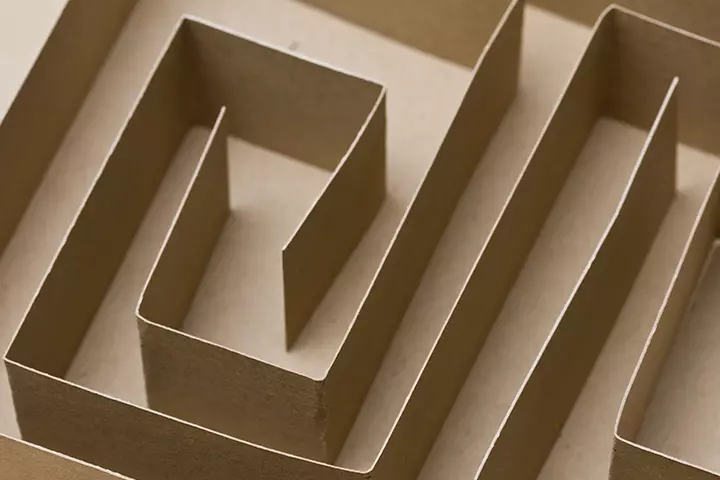
You will need: Old carton boxes – no taller than your little one
How to: Here is one of the amazing outdoor games for toddlers. Take some old carton boxes, and disassemble to form single sheets. Keep sorting them in a way to create mazes in an outdoor area or lawn. You can refer to any simple paper-based maze or puzzles for reference and replicate the design in three dimensions. Once done, ask your little one to enter the maze and encourage him to find his way out. Keep the length of the maze small and simple. Make some small changes to the maze to keep things exciting.
Skills developed: Basic problem-solving, understanding of space-direction interplay
6. Zig-zag walk

You will need: Small toy traffic cones, a toy
How to: Arrange the cones in a zig-zag pattern for a distance of about 10 feet. Make your toddler walk through the cones. Place a toy at the end of the trail and when your 18-month-old reaches the end, ask him to pick the toy and come back the same path. Great game on a lazy afternoon! You can ask your toddler to hold one of their push-and-pull toys and walk through the cones to add more fun to the activity and help improve your toddler’s walking, balance, and coordination skills.
Skills developed: Muscle coordination, body balance
7. The slipping ice
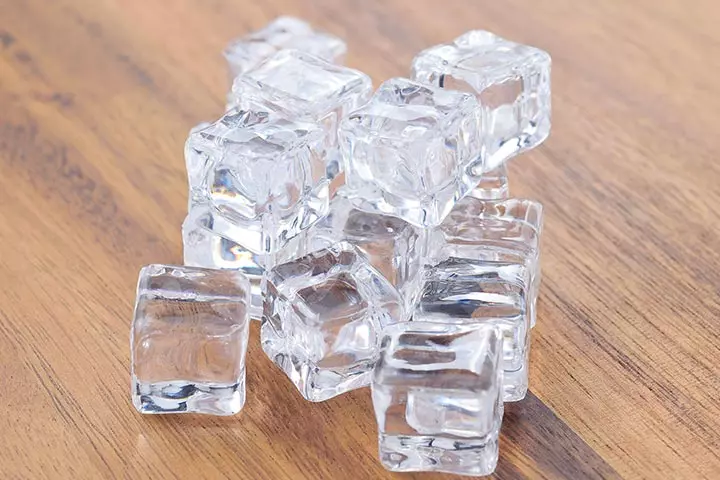
You will need: Bowl, chopping board, ice cubes
How to: You can play this right on your dining table. Take a bowl and hold a chopping board at an inclination close to it. Ask the baby to pick an ice cube and slide it over the chopping board in a manner that the cube falls into the bowl. Keep moving the bowl to different positions to up the challenge and maintain the baby’s interest. The sight of a sliding ice cube is surely going to keep him engrossed. You can color the ice cube by dissolving some food-based color in the water before freezing it.
Skills developed: Object motion interpretation
8. Pass the ball at once!

You will need: A couple of light plastic balls
How to: Sit down on the floor and make your toddler sit opposite you at a distance of about two feet. Give them a plastic ball while you hold one yourself. Ask them to pass the ball, and you slide your ball toward them the moment they do. Repeat the instruction, and you pass yours again when they pass the ball. Soon, they will understand that they will attain a ball from your end when they slide theirs. It will help improve their hand-eye coordination and prediction skills through this ball play.
Skills developed: Cause and effect, Understanding a pre-decided event
9. Find hidden object

You will need: Some small toys
How to: It is a great indoor activity for your 18-month-old. Make your toddler stand at the doorway while you hide about a dozen small toys all across the room. Do it in their line of sight, which means they see you hiding the objects. Once you are done, ask them to find the hidden toys one by one. Prompt and encourage them all throughout the peek-a-boo activity that will help enhance their exploration skills.
Skills developed: Memory recall, event-memory interplayiA mental construction of a scene recalled from a single occurrence of said scene.
10. Join the music
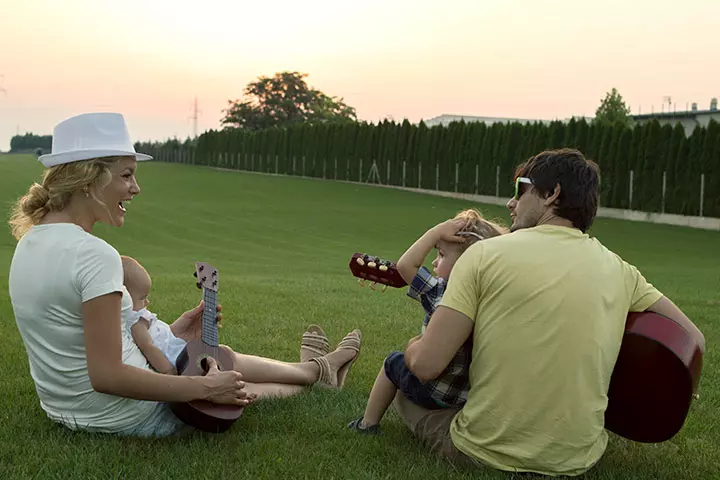
You will need: Small drums, rattle, some musical instruments, and your partner
How to: Here is a great way to have your very own musical ensemble. Give your partner a rattle while you take another musical instrument like a guitar. Give the toy drum to your baby and ask him to beat it when you play a certain note. Maintain a certain rhythm so that the baby understands the exact moment he needs to tap the drum.
Melissa, a mother of three and former teacher, shares a few development activities she tried with her son Kade on her blog Oh Hey Let’s Play! Emphasizing the engagement of musical instruments, she writes, “When Kade and I played with these together, I would demonstrate different ways to use the instruments, talk about loud/quiet, fast/slow and describe the different sounds we could make (i).”
Skills developed: Music-rhythm interplay, basic coordination
11. Hide and seek

You will need: You, your baby and partner
How to: Nothing beats a good old family game! You can play this game indoors or outdoors. Make it a point you hide at places where your baby is quite likely to find you. This is a great way of spending quality time with your baby (4).
Skills developed: Social bonding, Curiosity
 Point to consider
Point to considerEducational and Learning Activities
These activities are educational in nature and acquaint your 18-month old to basic pre-schooling knowledge.
12. Match the tag

You will need: Sheet of paper, a pen
How to: Write down the names of basic household items like bed, shoe, table, etc. each on a piece of paper. Show these tags to your toddler and point at the item it means. Do so a couple of times. Shuffle the tags and then hand each tag at a time and ask your baby to place it on the object. Remember your baby cannot read. Therefore, they will understand the tag by the sound only. So repeat the word until they understand. In case they seem disoriented, prompt them with words like “Oh look where the bed is.” Repeat the activity regularly, each time with a new set of objects.
Skills developed: Language skills, object-noun associationiThe ability of a child to connect objects with related words.
13. Simon says…

You will need: Your partner
How to: Ask your partner to play the part of Simon. They must exclaim “Simon says…” followed by an action phrase. If they say “Simon says, touch your nose!”. Ask your child to touch their nose. Your partner says “Simon says, touch your ears!”. You touch your ears while looking at your toddler, and he will repeat the same. Continue the activity with other parts of the body and objects.
Skills developed: Basic learning of various parts of the body, object-noun association
14. Everything in pairs, please

You will need: Pair of cards with identical illustrations
How to: Take a set of cards and lay them on a table. Give the corresponding set of cards to your toddler and ask them to place it beside the card with the matching image. Use verbal cues to encourage them to find it. Every time they find a match and form a pair, encourage them with some appreciative words. Use simple images on the cards like that of a cat, dog or other objects that the baby can recognize.
Skills developed: Object and pattern recognition, understanding pairs
15. Match balls and basket
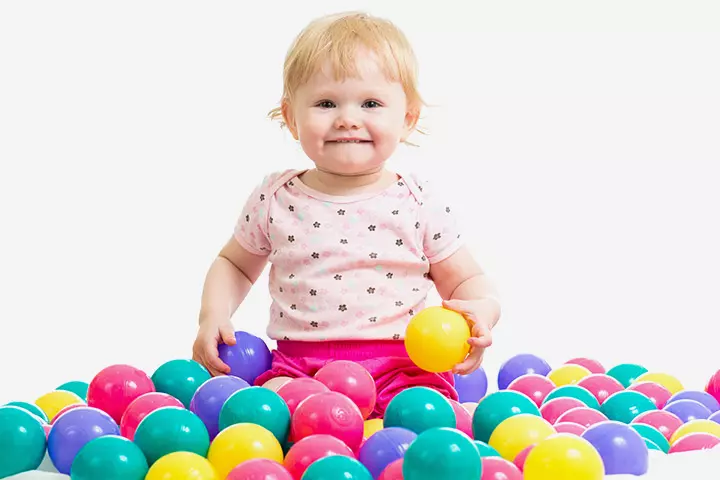
You will need: Three or more colored baskets with plastic balls of corresponding colors.
How to: The activity is quite similar to the previous one. Take three baskets of a color each and place them in a row. Bring another basket with several balls that correspond to the color of the baskets. Ask your toddler to pick the balls and place them in the basket of a matching color. Give them clues if they make a mistake, and appreciate them whenever they get a match right.
Skills developed: Color recognition, grouping similar items together
16. Counting on fingers

You will need: You and your baby
How to: An 18-month-old will be able to use their fingers with improved dexterity. This makes it a great time to introduce them to basic numbers through fingers. You can start with numbers from 1 to 5, and if the baby shows interest, you can teach them up to 10. The best way to start is to show them a finger and say “one” then show them two fingers and say “two”, and so forth. To reinforce the numbers in their mind, show them the number of fingers and ask them “How many?” and let them reply with the number.
Skills developed: Basic preschool mathematics, basic number-quantity associationiThe ability to connect a numeral to the associated number of objects.
17. Trace the drawing

You will need: Basic drawings, butter paper
How to: Your toddler will love holding a crayon and scribbling around on surfaces. Channelize their interest in art through trace and draw activity. You can buy any tracing book available in the market or print your own simple illustrations and make them trace on a butter paper. Make sure the illustrations are simple for them to draw. They may trace clumsily, but they are just getting started!
Skills developed: Introduction to art, hand-eye coordination
18. Paper folding
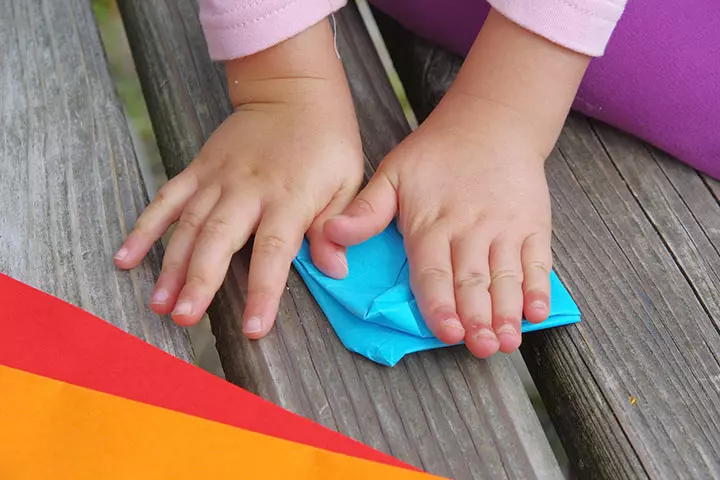
You will need: Colored paper
How to: Fold some colored papers into basic shapes and show him the steps you take to fold the paper. Start with basic shapes like a paper fan, which your toddler can play with later. The best way to involve him in the activity is to grab his attention by saying “Look what mommy is making!”. Once you get his attention hand him a paper and hold his hands and help him replicate the folds you made.
Skills developed: Introduction to art, interpretation, and imitation
19. String the guitar
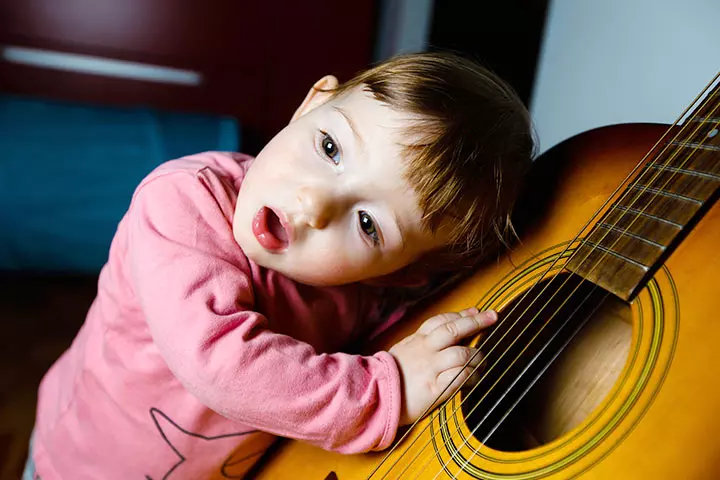
You will need: A guitar
How to: Music can transfix a baby. Make your baby sit in your lap. Bring a guitar close to you and hold it so they can see the strings. Strum on the strings and see your baby’s reaction; ask them to play on the strings. Let them experiment while you make sure their fingers are not hurt (5).
Skills developed: Introduction to music, tactile response
20. Building blocks
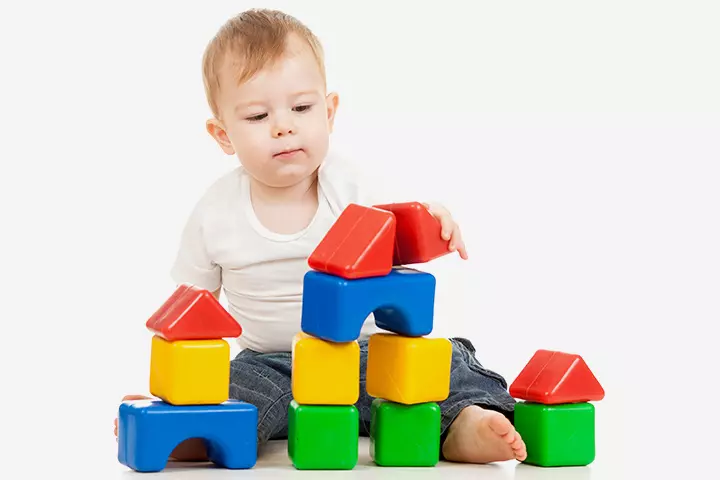
You will need: A building block set
How to: One classic game for toddlers that involves stacking objects is building blocks. Building blocks come in different shapes, sizes, and colors, making them versatile tools for teaching toddlers different ways of stacking objects properly. So buy a building block set that is vividly colored to attract your 18-month-old’s attention.
Parents of four and creators of the YouTube channel The Carnahan Fam stand behind this activity. In one of their videos, Kaleigh, the mom, shares that they use building blocks activity for their 18-month-old son’s fine motor skill development. She also calls out the names of the colors on the blocks while her son is stacking them on top of one another for a more interactive session (ii).
Skills developed: Knowledge of object interaction and balance
Sensory Activities
These activities stimulate the sensory reflexes of your baby and help him interpret things.
21. Animal sounds
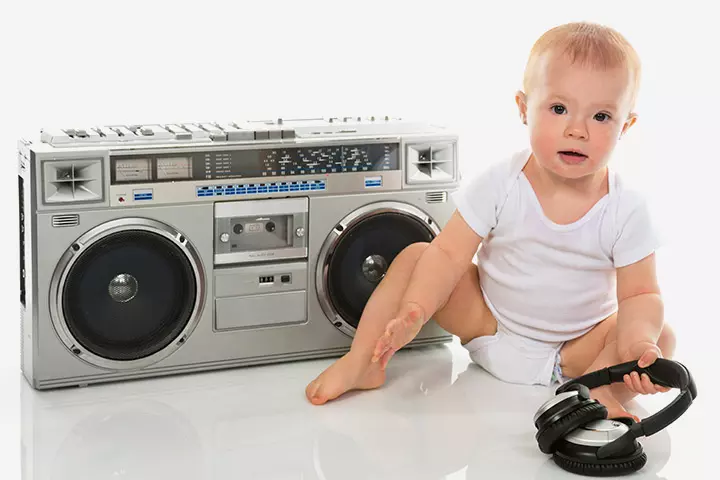
You will need: Recordings of various animal sounds
How to: Play an audio of an animal sound, for example, a lion roaring, and exclaim to your toddler, “Whoa, that is a lion!”. Do so with other animal sounds and then play them again. Each time a sound is played, prompt your toddler to name the animal. You can even mimic the sound to add an element of fun and make your baby learn better. In between, you can play music and get involved in signing and dancing with your toddler.
Skills developed: Sound-object associationiThe ability to make an association between sounds and objects and store the information in the memory. , sound recall
22. Smell the name!
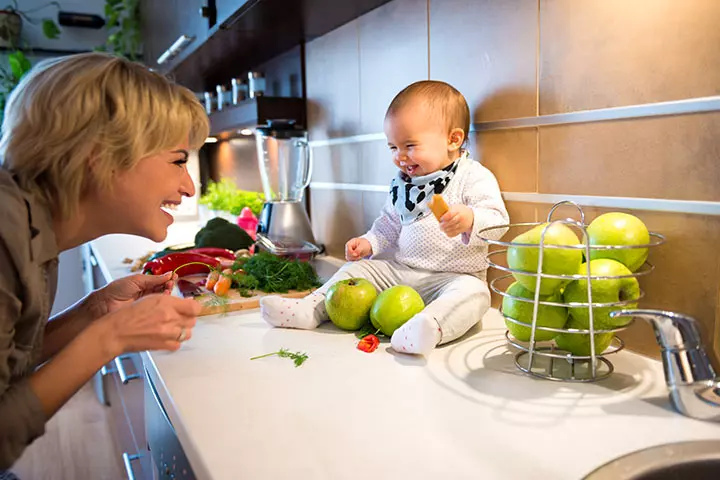
You will need: Your baby’s favorite food items
How to: Make them sit in your lap and gently cover their eyes with your hand. Bring their favorite food item close to their nose and tell its name. Prompt them to say the name along with you. Use food items with short and simple names that are easy for an 18-month-old to pronounce.
Skills developed: Object-smell association
23. Dough lumps
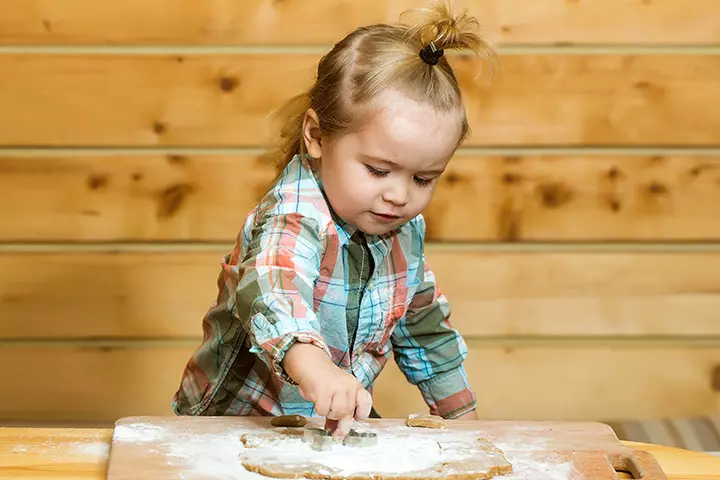
You will need: Wheat flour dough and a plate
How to: Toddlers love exploring objects with their hands. Here is a fun sensory activity for your 18-month-old. Take some wheat flour dough and show your baby how to make lumps using your hands. Ask them to make lumps and place them on a plate. You can make these dough balls together. They will get messy after the activity, so play before their bath time (6). You can perform this activity with baby-friendly play dough as well.
Skills developed: Shape making, tactile experience
Mahima Satvik, a blogger and mother, explains how playdough mats help toddlers learn letters, numbers, and colors. She shares, “Playdough mats have outlines of different objects like letters, numbers, shapes, or animals. I roll small balls of playdough and my toddlers use their developing fine motor skills to press the dough into the outlines on the mat. They are learning so many new concepts as they create silly playdough creatures, their names or simple patterns. Playdough mats build fine motor strength needed for writing while also exposing toddlers to letters, words, counting and animals (iii).”
24. Paint palm print!
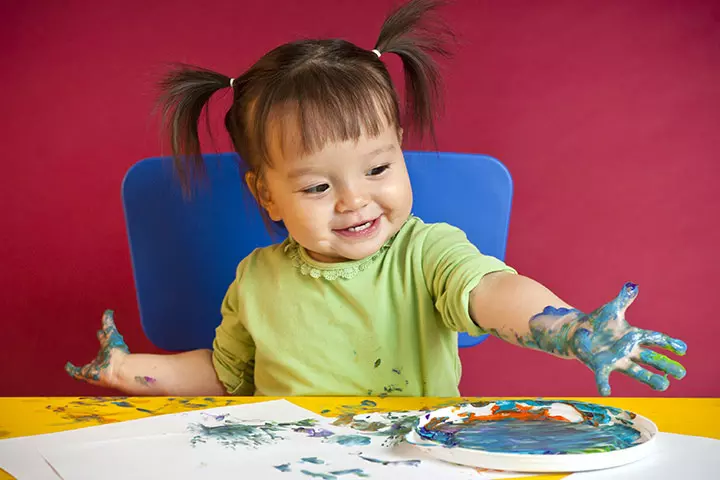
You will need: Food-based colors, piece of paper
How to: Buy some edible colors or make some at home using vegetable puree. Make a set of five colors and pour them into bowls. Ask your baby to dip their palm in the color and leave a palm print on a piece of paper. Encourage them to make some designs and praise them with words like “Wow, that’s nice”. their artwork may not last since the paints are food-based, but they will be safe in case they put their hands in their mouth. You can do the same activity with a twist, asking your baby to dip their fingers in the color and create abstract finger paintings!
Skills developed: Color familiarization through touch and vision
25. Family photo time

You will need: Family photo album
How to: Sit with your baby and open the family album. Point your finger at each individual in the photographs and ask him who that person is. He will definitely recognize his parents, but this is the right time to acquaint him with other relatives. Every time you point at someone in the picture, mention the relationship, and make your toddler repeat it.
Skills developed: Visual memory reinforcement, Face recognition
26. Bean bag toss
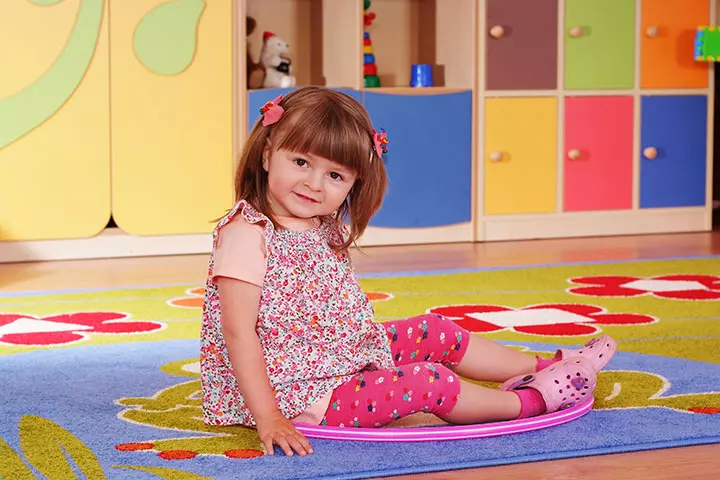
You will need: Soft bean bags or fabric pouches in different colors, hula hoops
How to: Place the hula hoops on the ground, ensuring they are at a suitable distance from your child. Demonstrate how to pick up a bean bag and toss it gently toward one of the hula hoops. Prompt your child to observe as the bean bag lands either in or close to the target. When your child successfully lands a bean bag into a target, show appreciation by using positive words, clapping, or smiling, conveying to them that they have done an excellent job.
Skills developed: Hand-eye coordination, sensory exploration
Those were some amazing cognitive activities for toddlers to nurture their sensory, cognitive, and physical development. But to make them interesting, you need to know the trade secrets.
5 Basic Tips For Parents Of 18-Month-Olds
Follow these secrets of having a fun time with your 18-month-old (7).
- Babies can be moody and throw temper tantrums. So, introduce an activity when he is in a playful mood.
- Keep switching between different activities. Also up the challenge in an activity if you observe that your baby finds the game so easy that he gets bored quickly.
- Each baby is unique. Be patient if your baby takes more time than their peers to understand and participate in an activity.
- Do not thrust a game on your 18-month-old in case he repeatedly shows disinterest to the point of frustration and crying.
- Always interact with your baby no matter what the game. Do not just be a mute observer. Speak to your baby, prompt him, and hold his hand to help him. An 18-month-old will show more interest if you play along and provide feedback and encouragement.
Frequently Asked Questions
1. How can parents and caregivers create an environment that encourages learning for an 18-month-old?
To encourage learning in an 18-month-old, parents and caregivers should ensure the baby has enough space to move around and explore freely. While moving around will promote healthy development, exploring things can help their learning (8). You can also include learning games and activities, such as block play, Simon says, Match the tag, and Counting on fingers, in their play routine to encourage learning. Puppet shows are another interactive way to encourage a toddler to learn while having fun.
2. What are some tips for developing my 18-month-old baby’s language skills?
Babies and toddlers can start speaking and developing vocabulary at their own pace. However, interacting with them regularly and asking questions, teaching simple songs and rhymes, and engaging them in activities, such as pretend play can help them improve their language skills (9).
3. What tips and tricks can I use to make playing with an 18-month-old baby enjoyable?
Playing with an 18-month-old is a fun experience, but you can make these moments more enjoyable by including fun games and activities, following your baby’s lead, playing outside, and making funny noises and faces while playing.
4. What are some outdoor activities suitable for my 18-month-old baby?
Outdoor activities for an 18-month-old include nature walks, sandbox play, and exploring parks. Introduce simple outdoor games such as throwing a ball and catching bubbles. Remember to choose safe environments and supervise your child during these activities.
While planning games and activities for an 18-month-old, consider their developmental milestones. Understand that each child grows at their own pace and hence refrain from panicking if your child is not able to perform a particular task. Instead, introduce the activity to them and let their comfort levels take the lead. It may also help to include activities focussing on each area of their development. This way, your child can simultaneously work on their cognitive, motor, and observation skills for holistic development.
Infographic: Games And Activities For Your 18-Month-Old
By this age, your baby would have learned to communicate little things; and it is essential to engage them in diverse activities that enhance their skills and overall development. This infographic suggests some simple activities and games for your 18-month-old; look for the ones most suitable for their interests.
Some thing wrong with infographic shortcode. please verify shortcode syntaxIllustration: Fun Games And Activities For Your 18-Month-Old Baby
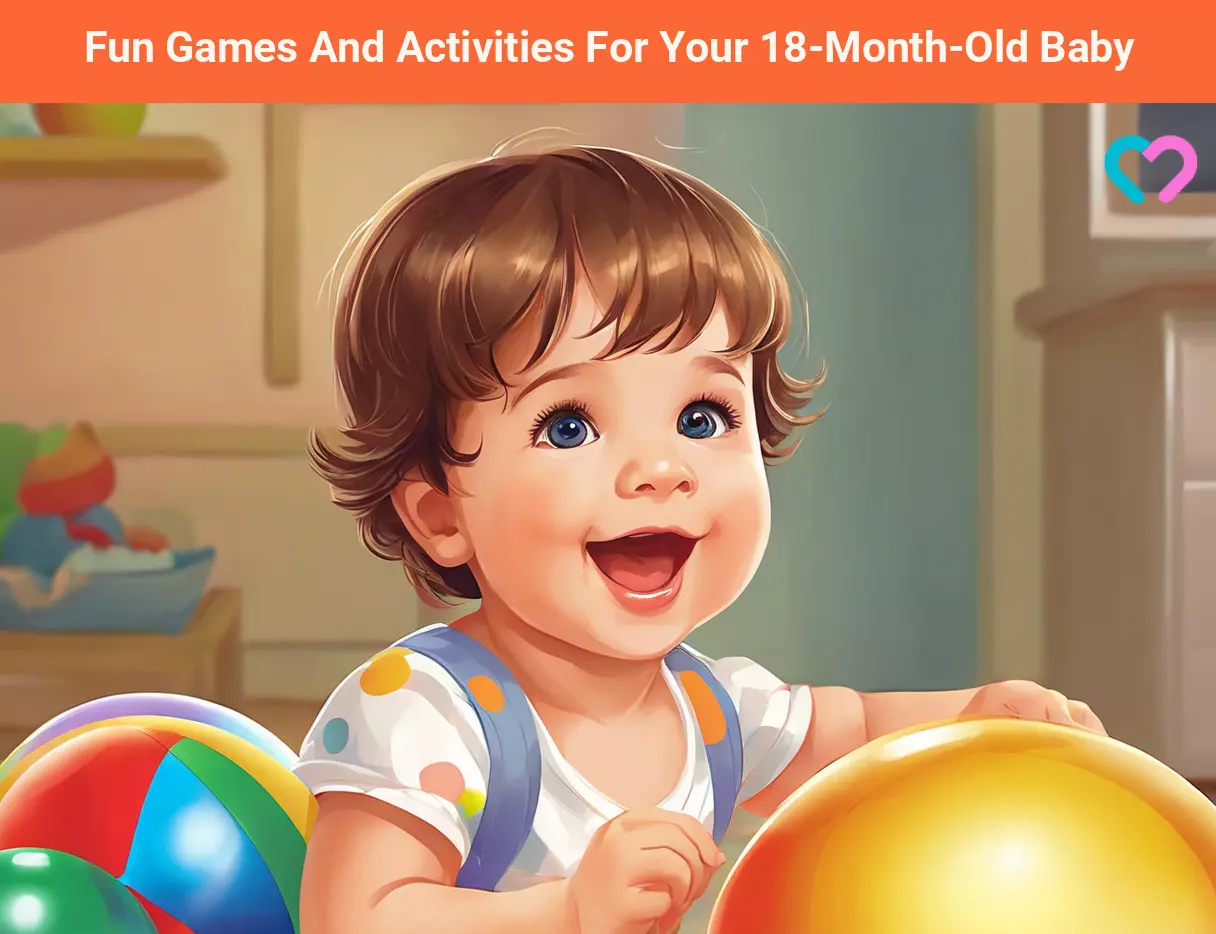
Image: Stable Diffusion/MomJunction Design Team
Gain inspiration for some great indoor activities that will enhance the fine motor skills of your toddler. From rolling, and stacking, to posting, you will find plenty of fun activities.
Personal Experience: Source
MomJunction articles include first-hand experiences to provide you with better insights through real-life narratives. Here are the sources of personal accounts referenced in this article.
(i) Activity ideas for 12-18 month-olds https://ohheyletsplay.com/home/activity-ideas-for-12-18-month-olds(ii) How to play with your 18 month old | developmental milestones | what you need to know
https://www.youtube.com/watch?v=p-PYP2jahhA
(iii) 10 Fun & Educational Activities to Keep Your Toddler Engaged
https://medium.com/@mahima.satvik/10-fun-educational-activities-to-keep-your-toddler-engaged-364529376f36
References
- Milestones for an 18-Month-Old Child
https://www.uofmhealth.org/health-library/ue5756 - Important Milestones: Your Child By Eighteen Months
https://www.cdc.gov/ncbddd/actearly/milestones/milestones-18mo.html - Freeze Dance.
https://thegeniusofplay.org/genius/play-ideas-tips/play-ideas/freeze-dance.aspx#.YiBxcuhBy3A - Games.
https://pathways.org/all-ages/games/ - Indoor play ideas to stimulate young children at home.
https://www.unicef.org/parenting/child-care/games-child-development - 17 Sensational Sensory Activities for Toddlers.
https://www.rasmussen.edu/degrees/education/blog/sensory-activities-for-toddlers/ - Tips on Playing with Babies and Toddlers.
https://www.zerotothree.org/resource/tips-on-playing-with-babies-and-toddlers - Supporting Physical Development: Environments and Experiences
https://www.virtuallabschool.org/infant-toddler/physical-development/lesson-3
- Tips on Learning to Talk.
https://www.zerotothree.org/resource/tips-on-learning-to-talk/
Community Experiences
Join the conversation and become a part of our nurturing community! Share your stories, experiences, and insights to connect with fellow parents.
Read full bio of Dr. Nirmala Shireesh Dharap
Read full bio of Rohit Garoo
Read full bio of Dr. Ritika Shah
Read full bio of Trisha Chakraborty





